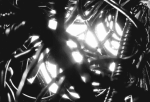I was looking today for some Haruki Murakami books, because I have to decide to read in Italian or English, and the Italian version of 1Q84 is divided in two parts whereas the American hardcover is one volume (so one point for the latter).
But while looking at another big volume he wrote, “The Wind-Up Bird Chronicle”, I discovered that the English version has been arbitrarily cut. There’s an article here that explains the process and it’s horrifying. Especially because these cuts are somewhat justified by saying that the original writer continues to edit his works, and so no fixed version would exist anyway.
The cutting done on WIND-UP is a complex matter. The more you look into it and into the question of revision, the more you realize there is no single authoritative version of ANY Murakami work: he tinkers with everything long after it first finds its way into print.
[…]
I did virtually all the cutting on WIND-UP, but I would have done none at all if Knopf hadn’t told Haruki that the book was too long and would have to be cut by some number of words (I think it was around 25,000 words). Afraid that they would hire some freelancer who could wreak havoc on the novel, and filled with a megalomaniac certainty that I knew every word in the book–maybe better than the author himself–after having translated all three hefty volumes, I decided to forestall the horror by [doing it myself].
Fuck the publishers (and translators convinced they can write a better book than the original author). Why don’t you go and “edit” Mozart or van Gogh?
The only mitigation to this is merely that Murakami seemed involved in the process, even if the cuts he suggested himself weren’t respected.
Having recently completed Book 3, Haruki felt incapable of cutting that, but he had enough distance from Books 1 and 2 to mark many passages for elimination–many SHORT passages that didn’t add up to much in terms of word count. I included most–BUT NOT ALL–of his cuts as part of my cut version
Later, when the paperback version of the Japanese text appeared, I found that Haruki had incorporated into that many–BUT NOT ALL– of the cuts he had suggested for the translation
Haruki did NOT, however, adopt the large cuts made for the translation into the Japanese paperback
And finally the admission that the English version sucked:
I do think that if THE WIND-UP BIRD CHRONICLE outlives its time and becomes part of the canon fifty years from now, a re-translation will be needed, and scholars can have a fine time screaming about how Jay Rubin utterly butchered the text.
I’m not a scholar and I’d already scream without the need to read the book. You just CAN’T do as you please. Write your own books if you want to mess with them.
See this other horror:
This last point may be related to one of the problems I’ve encountered translating modern Japanese literature: a different notion of editing in Japan. What I mean is, at times I notice inconsistencies, repetitions, and illogical parts in original Japanese texts that I am pretty sure an American editor would have weeded out. When I translated an early novel (not by Murakami) I felt at times that I was both translating AND editing. (They wouldn’t let me get paid for both, unfortunately.)
He even wanted to be PAID twice as much for butchering a text he didn’t write. And then he candidly says this:
Thus when it comes time for people like us to translate them, we–and our editors–have to massage the original to make it fit OUR notions of a tight, logical text.
I’m starting to believe that fan translations of Anime and Mangas are far more competent and faithful than these presumed “literary” works.
The first review that appears on Amazon seals the deal:
But what the previous reviews do not mention is that the American publishers, Knopf, forced Murakami and his translator, Jay Rubin, to significantly abridge the original Japanese text. The casual reader would have no way of knowing this, and, indeed, I only noticed because I was reading alternating chapters of the book in English and Russian translations. Half-way through the novel, entire chapters suddenly started disappearing from the English-language text. Puzzled, I went back to the copyright page of the English-language edition, where, for the first time, I noticed the cryptic notation that the book was not only translated but also “adapted from the Japanese.”
How much of the original text was “adapted” away? I don’t read Japanese, but, based on a comparison with my Russian-language translation, which appears to be complete (no Russian publisher would commit such a travesty on an award-winning novel), it seems that something like 15-20% of the text has been cut. For those of you who find the English-language text of the “Wind-Up Bird Chronicle” choppy, or puzzling, or seemingly incomplete, at least some of the blame lies at the feet of the American publishers who decided, unilaterally, that American readers cannot handle a long book.
Ah, the Communists.


2 Trackbacks/Pingbacks
[…] Wind-up Bird Chronicle”, but in the Italian edition since I knew the English one was arbitrarily cut. I spent some time comparing this edition with the English one and found out four chapters or so […]
[…] Once again I’m baffled by how little consideration and attention major publishers give to major Literature writers. […]